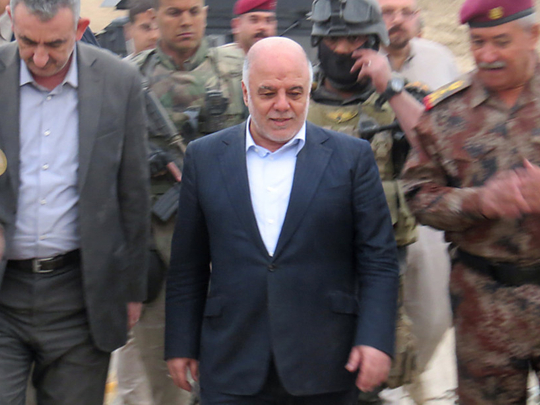
The Iraqi army, backed by American air power, recaptured most of Ramadi on Monday; seven months after the capital of Al Anbar Governorate fell to Daesh (the self-proclaimed Islamic State of Iraq and the Levant) militants with little resistance. It is an important victory for the elite Iraqi forces that were backed by local Sunni tribesmen and could be seen as a major juncture in the fight against Daesh in Iraq and a prelude to the liberation of Mosul in the Nineveh Governorate. The Iraqis claim that Daesh has lost more than 40 per cent of the territories it once held and is now defending smaller areas that make up less than 17 per cent of Iraq.
Preparations for the Ramadi offensive have been in the works for months and US military advisers have been working closely with the Iraqi army to coordinate the operation. But unlike the attack on Tikrit last April and Baiji in October, this time, the Shiite-dominated Popular Mobilisation Forces did not enter the embattled city. After weeks of besiege and heavy aerial bombardment, the majority of the militants’ Iraqi fighters abandoned the city, leaving behind few thousand foreign terrorists who put up a fierce resistance. It was not a surprise that almost 80 per cent of the city now lies in ruins.
The victory is more than symbolic. Daesh positions in Iraq and Syria have come under heavy shelling from land and air, especially after France and Britain joined the fight few weeks ago. Kurdish Peshmerga were able to liberate the Sinjar area north of Mosul in November, dealing a painful defeat to Daesh. They also cut off the main highway connecting the terrorist capital in Syria’s Al Raqqa to Mosul, their second prized gain. Syria’s Kurds were also making important advances in the northeast and the Democratic Syria Front managed to retake the strategic dam of Thishrin, not far from Al Raqqa.
Liberating Ramadi does not end the presence of Daesh in Al Anbar, a predominantly Sunni province that had become an incubator for Al Qaida, which later evolved into Daesh, following the US occupation of Iraq. Iranian hegemony over the political establishment in Baghdad and years of discrimination under Nouri Al Maliki’s notorious rule have allowed the terrorists to find a safe haven among the governorate’s disgruntled tribes.
The Iraqi army’s next goal will be to recapture Fallujah, 50 kilometres east of Ramadi, which had become a hotbed for Sunni zealots fighting Shiite domination.
Most of Al Anbar’s 1.5 million residents have been displaced as a result of Shiite intimidation and Daesh occupation. They make up more than one third of displaced Iraqis today. As they fled Daesh early last summer, they were denied entry into Baghdad and were left unaided in the open to fend for themselves. This treatment by the Shiite-led government in Baghdad added to their suspicions and acrimony. With most of their homes destroyed, the liberation of Ramadi will not change their dire situation.
Moreover, residents fear reprisals by Shiite militias while chiefs of Sunni tribes warned that the Baghdad government has failed to listen to their grievances. Furthermore, there is bad blood between Sunni tribesmen themselves since some had sided with Daesh and were allegedly involved in the killing of hundreds of members of other tribes who had stood up to the militant group.
Al Anbar will continue to pose a challenge to the Baghdad government as it did to the US occupation during the last decade. Sunni complaints of sectarian rifts and discrimination go into the heart of the political crises that have hampered Iraqi Prime Minister Haider Al Abadi’s attempts to carry out reforms and bring corrupt politicians, including Al Maliki, to justice.
Reconstructing the war-torn governorate will require billions of dollars; money which the government does not have. Furthermore, Shiite provocations of Al Anbar residents will deepen the sectarian rift and may recreate the social incubator that hosted Daesh in the first place.
It is vital that Baghdad understands the risks and challenges that accompany its fight against Daesh. The organisation has been weakened for now and is losing territory quickly, but the victims of this struggle have been predominantly Sunnis. Regaining the trust of the Sunni minority in Iraq is a major feat and it is vital to undercutting Daesh’s propaganda that it is the only group standing up to Iran and its Shiite agenda in the region.
Moving on to liberate Mosul will prove a more difficult task. The city is the second largest in Iraq and the cost of liberation on its civilian population will be high. Until the Iraqi government is ready to wage that campaign, it will have to launch a political process that brings Sunni powers on board. The sectarian rift will have to be closed somehow and Al Abadi must find ways to break away from Iran’s grip.
Osama Al Sharif is a journalist and political commentator based in Amman.










